Top tips from Mesmo Consultancy (and Associates) on how to save time and improve business and personal performance by ‘Taking Control of your Inbox’ and using proper business email etiquette.
Suffering from email overload? Rules are the way to reduce email overload. Finding it hard to see the important emails from the less important one, maybe even the dross which you never really wanted in the first place. Rules are the most powerful and effective way to de-clutter you inbox. Here is how to set a simple and more complex rule in Outlook 365 to filter out all the less important emails and allow you to see only those emails which really need your immediate attention.
1. Simple rules
Right click on the email. Select Create Rule. Then choose either the relevant action and appropriate folder to move the emails. Either an existing one or create a new one.
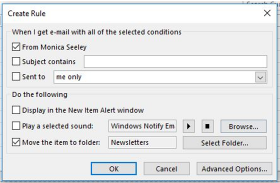
Click on the folder, then OK. From the next box ‘Success’, click the box marked ‘Run this rule..’ and click OK. This will clear out all the existing emails in your inbox which meet the new rule’s criteria. A great way to start decluttering end reduce the existing email overload.
This type of simple rule is useful for automatically moving emails out of the inbox to a folder to look at later, eg newsletters and emails from specific organisations/person.
2. Complex rules
Let’s suppose you want to highlight emails from a key contact (eg CEO, key client etc.). Proceed as above, BUT now click the Advance button. Click the initial action, ie the person or words on which you want the rule to action. For example from Julie Perinne. Then click next and tell it what you want to do eg mark all emails from Julie as ‘Important’. Then in the box called Step 2 click on the word ‘Importance’. Now select the level of importance. Then click OK. Again click through the Next buttons slowly until the last screen and run the rule and click OK.
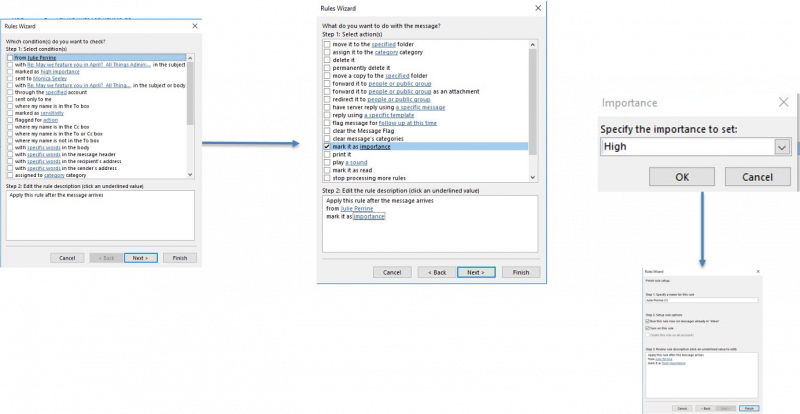 To delete/edit rules go to File/Manage Rules & Alerts and edit/delete rules as appropriate.
To delete/edit rules go to File/Manage Rules & Alerts and edit/delete rules as appropriate.
3. Viewing all the unread emails in folders
To see all your unread emails in one place use the Search Folders at the bottom of your inbox. See below.
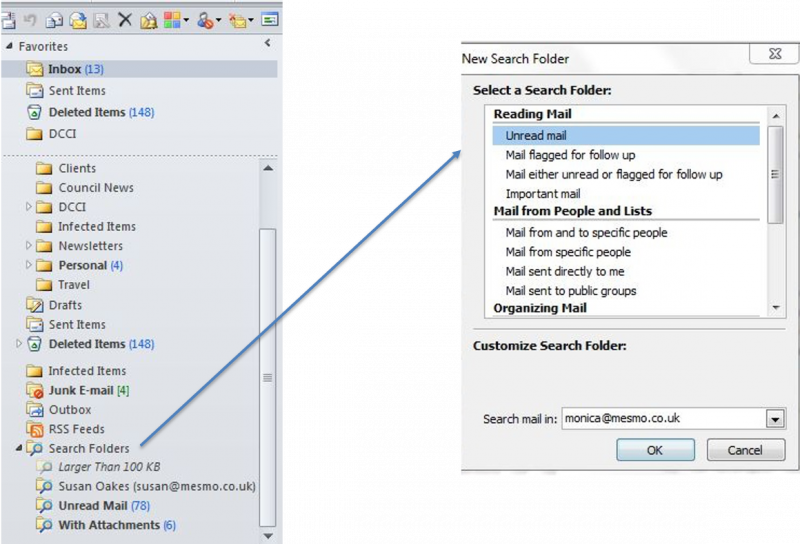
Using the Rules and Search Folders in Outlook 365 (and most other versions) will allow you to reduce email overload and save time dealing with email. It will also help you manage the risk of missing an important email amongst all the less important emails. Click here for more tips like this one.
Tags: Outlook 365 Rules, Reduce email overload, Save time dealing with email
Seven top tips for home working to make you more productive and effective. Home working has been talked about for years rather like the paperless office. It takes the COVID-19 virus to turn prophesy into reality. The question is how to be productive and effective whilst working from home and avoid all the surrounding distractions. Not least of which is information and email overload which is something several clients say has escalated out of hand.
At Mesmo Consultancy we have over 30 years experience helping people like you reduce email overload and work from home effectively. Over the coming week we will share our knowledge on both fronts.
Today, we want to share our seven top tips for effective and productive home working.

Effective home working
1.The home desk. Make it as safe and set up as possible to avoid stressing your muscles. We have seen some amazing make-shift desks from ironing boards to wine creates. Click here for some guidelines on the best desk set-up.
2.Stay focused on the task in hand. That means turning off all the new mail and social media alerts.
3.Practice slow email. Agree acceptable response times with colleagues internally and externally. You might have thought this impossible in the past but if ever there was a time to slow down the ridiculous pace of email exchanges it’s now.
4. Maintain your physical well-being. This means setting working time boundaries such as having a proper lunch break and after what time in the evening you stop checking your email etc. Maybe join an on-line gym, meditation, yoga group etc. Click here for more.
5. Limit the number of times you check your trusted news channels. Too much information can be worse than too little. No sooner have you recovered from one wave of bad news than another set knock you back again.
6. Keep talking. Allocate time to talk to colleagues whether through a conference call, text or chat app like what’s app. Ironically, we are hearing people say they are now talking more to colleagues than when they were in the office.
7. Up-skill yourself. Learning is a lifelong exercise. Without colleagues near by to show you how to do things eg set up a rule in Outlook, again this is the time to learn more about all the software you use and maybe some you have never thought about. Click here to see how well you use Outlook.
As we said at the outset, Mesmo Consultancy will be providing a series of tips on effective home working and smart email management including how to use Outlook and other related communications tools. These will be through a free fifteen minute lunch and learn webinar.
For more details (if you are not already on our database receiving our e-briefing) sign-up now. Email us with your name and put E-BRIEFING in the subject-line.
Tags: BourneFit, Home working, Mesmo Consultancy, Slow email, well being
Your grammar is a reflection of your image. Good or bad, you have made an impression. And like all impressions, you are in total control.
Jeffrey Gitomer
How do you use email etiquette to boost your performance and career? Your email etiquette defines you. It is your digital dress code. You may never before have met the person you are emailing but they will form a picture of you from the words, punctuation and grammar you use. Communications skills are now the second most sought after skill for the coming decade.
Good email etiquette implies good communications skills. Your aim should always be to convey the right message, right first time and in doing so a professional image of yourself. Punctuation, grammar and the correct use of the apostrophe is one way to achieve it. This saves everyone time and reduces the scope for misunderstanding and hence an email war.
A recent survey suggests that even in 2020, email is the preferred way to communicate in business and that there are still many words and phrases that business people really dislike such as:
Greetings: Hey; Happy XYX Day.
Sign-off: Kisses (xxx); Cheers.
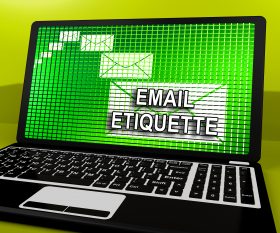
Email etiquette to boost your performance
Phrases: Keeping you in the loop; As per my last email; Any update on this.
General: Caps; Slang and clichés; Too many exclamation marks; Emojis; Typos and spelling mistakes.
Here are ten top tips for writing emails which have stood the test of time and which will help you stand out in today’s crowded digital environment.
1. Focus the subject-line on exactly what the email is about and what action if any you need and by when.
2. Use the BLUF principle. Bottom line up Front, that is headline at the top then follow it with the detail. Very important when emailing top executives if you want to catch their eye.
3. Keep the content succinct focused on a single topic and use simple words.
4. Avoid clichés as they can make you appear unimaginative and careless. For example, ‘just keeping you in the loop’. Rather, tell the person why you have forwarded the email – eg ‘thought you might like to know the sales figures are up 5% which reflects our new product’.
5. Use a neutral tone and avoid any emotive words. For example, if you need to remind someone to read your email, be more assertive (rather than aggressive) with words like ‘see below’ and be specific about what needs their attention.
6. Avoid one word responses which can be open to misinterpretation such as ‘OK’. Does this mean OK I will do it now or OK stop nagging me? Instead reply properly saying by when you will do the task.
7. Use plain simple fonts and text. Leave colour, emojis etc to social media and text messages. Despite their proliferation not everyone understands emojis and about 4.5% of the population are colour blind most of whom are men.
8. Use a professional greeting and sign-off. Keep all the more informal and familiar ones for social media and text.
9.Always include your contact phone number in the sign-off (even if it’s the fifth iteration and you only put your name – add your phone number).
10. Before hitting send, check your grammar and spelling and especially homonyms (eg bat the bird and bat the implement used to hit a ball).
Email etiquette is something over which you have control. Use it wisely to create the image you want to convey of yourself and improve your own performance.
For more tips like these see
Tags: Boost your career, Boost your performance, business email etiquette, email etiquette
Welcome to this guest post by Anne McGhee Stinson
Distractions – the impact on our performance
Minimising distractions at work is a key priority at work for those who want to improve their performance and well-being. Why is minimising distractions more important than ever before?

Distractions, Distractions
In a recent Harvard Business Review Article entitled Learning to live with Complexity the author states: “….[B]usiness today is fundamentally different than it was just 30 years ago. The most profound difference, we’ve come to believe, is the level of complexity people have to cope with.” This rising level of complexity is spawned by new technologies, a global landscape, and more collaborative work environments. Virtually everything about the way we work is changing creating massive distractions in the workplace.
While the complexity continues to increase we haven’t reckoned with the impact it has on our capacity to focus. Neurologically, our central nervous system is hard-wired to pay attention to the most distracting element in the environment. This response system is what kept us safe as a species of hunter gatherers, because the rustle in the bush may well have been a hungry lion.
Unlike today; our distant ancestors had the benefit of a period of recovery after surviving the lurking lion. They went back to the cave, ate, slept, and recovered in peace. There was no 24-hour news coverage, and none of the incessant demands of the modern workplace including back to back meetings, hundreds of emails, projects, teams, travel schedules etc.
External distractions are only part of the problem. In an overloaded society; the internal distractions caused by too much input, financial worries, relationships and family pressures take their own toll. Human beings have a limited amount of attention and energy to spend at any given time and because we are so inundated with complexity, information and data, our days are constantly filled with lurking lions causing our attention to be exhausted.
From a professional perspective, this can translate into an inability to access innovation, creativity, intelligent risk-taking, decision-making and our full performance potential. It can also mean we are missing opportunities for strategic connections, deepening relationships, mentoring, coaching, guiding and so forth. From a strictly personal vantage point, people are experiencing more stress, anxiety, isolation, and fear than ever.
Distractions – how to minimise them
Organizations must address these challenges with a new approach and train the skills most essential to success in complex, distraction laden work environments.
Initially, we must learn how to manage attention and energy at work, learn to reduce distractions, manage time and information input. These are the critical skills that will help employees stay productive in an ever-changing work environment. Some simple adjustments include:
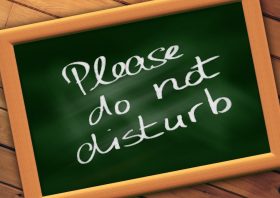
Stay focused
1. Turn off all the bells, chimes and notifications on your phone and computer. Instead schedule focused time to process incoming information.
2. Schedule routine 1:1 meetings with team and staff to reduce ad hoc interruptions during the day.
3. Work from home or a remote location where you are less likely to be distracted by open office environments.
4. Establish communication guidelines to set reasonable response time expectations.
Next, we must learn how to maintain focus on the priorities that matter most. Author Daniel Pink noted in his book “Drive” that an interesting change occurs in our brain when we commit to such a goal. He states; “Once we consciously focus on a goal, the brain subconsciously evaluates goal-relevant information in our environment that is consistent with achieving the goal. Like radar, it selectively notices incoming data that may contribute to or influence the goal. Concurrently, the brain inhibits irrelevant information to protect our delicate cognitive capacities from overload.”
5. Identify your priorities are, and create an emotional attachment to them to keep you focused.
6. Rigorously manage your calendar to make certain you’re are spending your time on what matters most.
7. Learn to say “no” or “not now” to less important priorities.
8. Limit your priorities to no more than 7-10 at a time.
9. Schedule routine meetings to address accountabilities on each priority.
Limit distractions and focus on what matters most. It’s a simple solution to a complex problem; and it works.
This guest post was from Anne McGhee Stinson, Managing Partner, InteraWorks (Elevating the Human Experience at Work) www.interaworks.com
Tags: Anne McGhee Stinson, Distractions at work, Improve mental health, Improve productivity, Improve well-being, InteraWorks, Managing work Distractions, Stay Focus
The ‘Honours List’ fiasco could so easily have been avoided if the Cabinet Office had followed a simple security processes.
No doubt there were several versions of the spreadsheet containing the honours list and we all know how easy it is to upload/send the wrong one. However simple steps like those above will reduce the risk of a disaster such as that created by the Cabinet Office.
Tags: Honour Lists Disaster